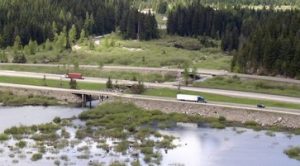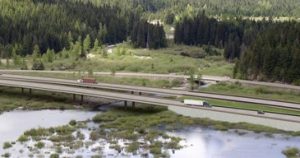Week 5 of the 2020 Session
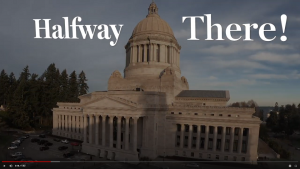
It’s the end of week five, and we’ve passed the first two major deadlines of the 2020 legislative session. With policy and fiscal committee cutoffs behind us, we have been spending a lot of our time on the floor of the People’s House, debating legislation and passing bills over to the Senate for their consideration.
Earlier this week, the House approved my joint memorial to recognize the International Year of the Salmon and affirm our support of continued investment in wild salmon recovery.
Tribal Regalia Legislation
I was also honored to speak on the floor in support of my legislation to allow students to wear tribal regalia at graduation if they so choose. While some schools in Washington already allow this, many do not. Every indigenous student should have the right to wear tribal regalia to show their resilience, and honor their ancestors who had to suppress their culture and heritage. I’m so pleased to report that my bill passed the House with almost unanimous support, and will now be considered in the Senate Early Learning & K-12 Education Committee.
“Thank you so much. It hurts me to think about incidents when parents were denied their wish to have their student culturally represented in their traditional way. You are our children’s hero.” – Patsy Whitefoot, Yakama Nation Member, Affiliated Tribes of NW Indian Education Committee Chair, and Grandmother
“Jamestown is fully in support of HB 2551 to recognize and respect our Tribal students to wear their ‘Traditional Regalia’ when accepting their diploma(s). We are proud of our students and their achievements. We respect university/college traditions, but consistent with our Government-to-Government relations and cultural practices, these state institutions must respect our cultural values as well. This bill clarifies that federally-recognized tribal student’s right.” – Ron Allen, Jamestown S’Klallam Tribal Chairman
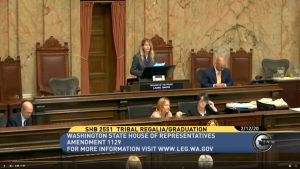
“As Chairman of the Suquamish Tribe and a member of the Tribal Leaders Congress on Education I would like to voice our Tribal Council’s support of the Tribal Regalia Bill 2551. Tribal leaders, cultural and language practitioners, native teachers, and policy leaders have long known that introduction of tribal culture and traditions in public schools through curriculum, hiring of native teachers and administrative staff, and use culturally sensitive assessment practices can and have increased tribal student success by allowing students to express their cultural pride. This bill is another positive contribution to past legislation that have and will contribute to creating a nurturing atmosphere for not only tribal student learning but the education of all Washington students, teachers and administrators.” – Leonard Forsman, Suquamish Tribal Chairman
Learn more about the work I’m doing in my recent video update or my speech on the floor.
Moving Forward with Net Ecological Gain
While passing policy and fiscal cutoffs means we have been debating bills on the floor this week, it also means that bills that didn’t make it out of committee won’t continue to move this session.
For example, House Bill 2550, my bill to establish a standard of net ecological gain, didn’t make it out of the Appropriations Committee. Our current standard of “no net loss” means decisions on land development are balanced with environmental impacts, leaving it no worse, but no better. By switching to a net ecological gain standard, or a “leave it better than you found it” standard, development projects would contribute to habitat restoration and help achieve a healthier environment for current and future generations.
A great example of this standard is the wildlife passage project on I-90. You can see in the pictures above (before) and below (after) that the project was developed and implemented with the intention of reducing impacts to the environment.
The death of the bill doesn’t mean the death of the policy. I’ll continue to work with my colleagues to potentially include this policy, which came out of the Orca Task Force, in a budget proviso, and continue to have these important conversations around using development projects to improve our environment and restore critical habitat.
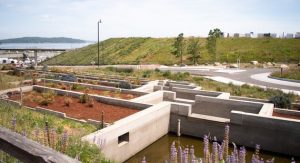
Workforce Education Investment update signed into law
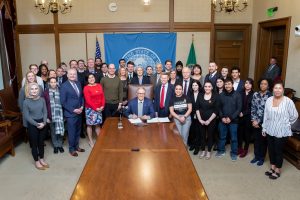
Last week, the Legislature passed a bill to simplify and improve the way funding is collected for the Workforce Education Investment, making it easier for businesses to comply and contribute to developing our state’s future workforce.
This week, Governor Inslee signed the bill into law, ensuring ALL our state’s students have the opportunity for a higher education. People want to get the education they need for a good-paying job and we offered them a solution, a promise. Now we are honoring that promise.
Death with Dignity
A decade ago, the Death with Dignity Act was approved overwhelmingly by voters, which brought great comfort to many people suffering from terminal illnesses. Constituent stories, like the one I received from my constituent Bill* about his wife Mary*, have relayed that this option has not been readily available to all.
Here is an excerpt from my floor remarks about Bill and Mary’s story:
“At night, when painful arthritis flared up in her back and right hip, Bill woke up from her rocking and whimpering. She would say, ‘Don’t listen. It’s all right. I can bear it.’
“But it wasn’t death she craved. It was dignity. And relief from the pain that consumed her life every day.
“Bill wrote me a letter, begging me to fix the system that failed Mary. A system that seemed to care far more about billable hours than letting a human being die with dignity.”
Stories like this shouldn’t be happening. We need to find a way to remove the barriers that keep Washingtonians from being able to die with dignity. That’s why I was proud to vote YES today on Rep. Skylar Rude’s bill to conduct a study on the barriers related to accessing Washington’s Death with Dignity Act and provide recommendations on how to fix this system for people like Bill and Mary.
*names have been changed for privacy reasons
Upcoming Events
Town Halls: I’ll be holding two in-person town halls on February 22. The first will be from 10:30 – 11:30 a.m. in the Skagit Valley College Multi-purpose Room. The second will be from 1:30 – 2:30 p.m. in the Fairhaven Library Fireplace Room. I hope to see you there!
For more information, check out the Facebook events for each of these town halls: Mount Vernon area Town Hall & Bellingham area Town Hall.
My kitchen table is your kitchen table – I will always have a chair for you.
Constituent Corner
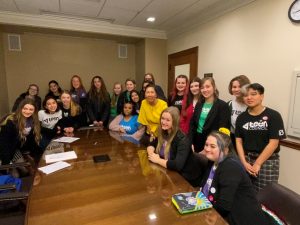
Comprehensive Sexual Health Education
I’ve heard from many of you, both in favor of and opposed to the comprehensive sexual health education legislation currently being considered in the Legislature.
I support comprehensive sexual health education in our public schools. It should be medically and scientifically accurate, age appropriate, and appropriate for students regardless of gender, race, disability status, or sexual orientation. That is why I support this legislation, which would require comprehensive sexual health education with an affirmative consent curriculum in all public schools by the 2022-23 school year.
This legislation is so important for Washington students. Comprehensive sexual health education will teach them the skills to identify and prevent sexual assault, in addition to teaching the skills to engage in healthy, consensual relationships. For young K-3rd grade students, this means teaching social and emotional learning. “Bad touch” and “be a good friend” are foundational building blocks for later education.
This bill doesn’t take away local control, and school districts can select the curriculum that works best for their community, or can even design their own curriculum in partnership with OSPI. In addition, parents or guardians can request to view the curriculum and schools must let them opt their child out if they so choose. Our state always has and always will prioritize parents’ involvement in their children’s education.
As a survivor of sexual abuse myself, I believe comprehensive education is key to preparing our younger generations for tomorrow. By preparing them with knowledge, we can ensure that Washington students are equipped to be safe, healthy, and mature.
Notable Meetings
Washington State School Directors’ Association Advocacy Day
- I met with Superintendents and School Board Directors from Mount Vernon, Anacortes, Orcas Island, La Conner, and Sedro Woolley School Districts. We discussed school levies, K-12 funding, and the need for more school nurses and behavioral health specialists.
SeaMar Community Health Centers
- We discussed ensuring our rural communities have access to the health care they need.
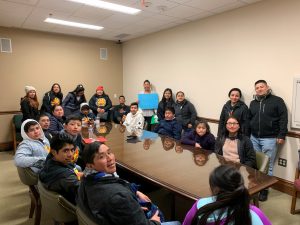
Community 2 Community
- I met with farmworkers and their families from Whatcom and Skagit Counties. I also spoke at their Farmworker Tribunal about how hardworking farmworkers are key to a thriving agricultural industry and the importance of having access to locally grown, nutritious foods.
North Sound 2-1-1
- I met with representatives who serve Snohomish, Skagit, Whatcom, San Juan, and Island Counties. They provide comprehensive information and referral services about community health and human service agencies. If you or anyone you know needs help, they are a great resource! Visit their website, call 211, or call 1-877-356-9211.
Dean Fearing from Kulshan Community Land Trust
- We discussed affordable homeownership using the community land trust model, housing and economic development, and House Bill 2570, which I cosponsored.
Taking Native American Voting Rights Nationwide
571 federally-recognized tribes gathered at the National Congress of American Indians in Washington, D.C. this week. Members took the opportunity to testify before Congress on issues of great concern for Native American communities, such as access to voting. One such member was Leonard Forsman, Chairman of the Suquamish Tribe and President of the Affiliated Tribe of Northwest Indians.
Chairman Forsman testified before the Elections Subcommittee of the Committee on House Administration about the barriers to the ballot that Native Americans face and called on Congress to adopt legislation similar to the model work we’ve done here in Washington state with the Native American Voting Rights Act, which passed last year.
We must continue to build the relationships between our tribal, state, and federal governments, so together we can ensure every American has the opportunity to vote, whether this has been their home since time immemorial or they now call this country home.
Thank you all for taking to the time to read this week’s Fantastic Friday, and for taking an interest in our progress at the House of Representatives. I will be sending out a Fantastic Friday letter each week throughout the legislative session.
Please feel free to reach out to me using the information below, with any questions, inquiries, or concerns you may have.
I am here for you!
All best wishes,

Rep. Debra Lekanoff

